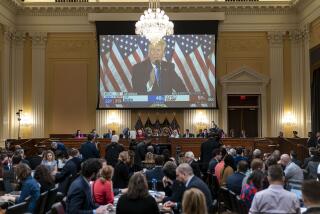Get the Obvious Done Fast
- Share via
The Senate convenes today with the impeachment trial of President Clinton its first order of business but with no consensus about how to deal with that historic responsibility. The 100 senators, all of whom will swear Thursday to serve as impartial jurors, are sharply divided between those who favor at least the option of a brief trial and those who insist that the process must run its full course, with witnesses called and the sordid details that lay behind Clinton’s alleged perjury and obstruction of justice once again dragged before the public. The determining question should be which approach is better for the country. The unarguable answer, we think, is that a quick resolution is in the nation’s best interest.
We would prefer a prompt censure without rehashing all the evidence. But more politically feasible, bipartisan outlines for how the Senate might proceed have been put forward. One, by Sens. Slade Gorton (R-Wash.) and Joseph I. Lieberman (D-Conn.), would give House prosecutors several days to present their case and then there would be several days of White House response and a “test” vote to see whether senators had found that the charges were serious enough to remove Clinton from office. That proposal is losing steam, however, perhaps to be replaced by another that would drop the test vote and go directly to a brief presentation of evidence and a vote on the impeachment articles.
Whatever the method, it is clear that the Senate must avoid a prolonged and legislatively disruptive trial that would be destined from the outset to end in Clinton’s acquittal. The Senate needs to get on with its regular business, something it assuredly could not do for weeks if it was compelled to listen to the testimony and cross-examination of many witnesses. It would be a drawn-out trial that only a minority of senators, cheered on by House conservatives, actually want. Some senators have worried aloud about whether a short proceeding would insult their colleagues in the House. They ought to worry instead about whether an excruciating trial would be insulting to the will of their constituents.
Virtually all senators agree that there are not enough votes to convict Clinton and end his presidency. The key argument made for pushing ahead with a full-scale trial nonetheless--that the public for its own edification ought to hear once again all the details of Clinton’s perfidy in office--is disingenuous and not persuasive. The Senate is not required to dance to the essentially partisan tune that gave rise to the House’s articles of impeachment. And certainly no morally instructive or otherwise necessary purpose, short of heaping further humiliation on an already discredited president, would be served by another recital of what went on in private between Clinton and Monica S. Lewinsky. Americans have heard more than enough about all that.
A quick proceeding that makes clear the Senate’s strongest disapproval of Clinton’s apparent lying and leaves no doubt that Clinton brought this upon himself remains the right course. A prolonged trial ending in predictable acquittal would not be satisfactory in any respect.
More to Read
Get the L.A. Times Politics newsletter
Deeply reported insights into legislation, politics and policy from Sacramento, Washington and beyond. In your inbox twice per week.
You may occasionally receive promotional content from the Los Angeles Times.










